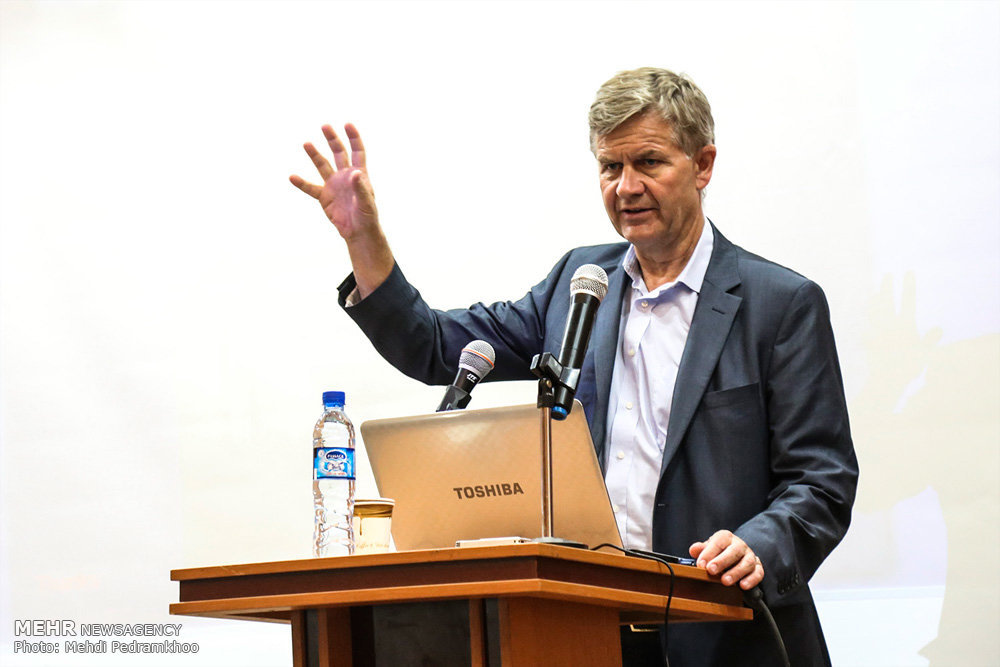UN ready to settle environmental disputes with best available knowledge: UNEP chief

TEHRAN — The United Nations is ready to provide scientific solutions to resolve environmental disputes among governments, executive director of the UN Environment Program (UNEP) Erik Solheim said on Monday.
Solheim was in Tehran to participate in the International Conference on Combatting Sand and Dust Storm which was underway from July 3 to 5. More than 30 countries participated in the conference at ministerial level.
“We believe that the solution [to environmental issues] should be based on science and the United Nations can provide the best available knowledge when there are disputes,” Solheim told the Tehran Times in an exclusive interview.
Below is the text of the interview:
Q: Such conferences like the one in Tehran release joint statements and declarations which are not legally binding. So, are there any chances that the outcome of the Tehran conference on dust and sand storms would become a protocol?
A: My perspective is that if we look at environmental issues and treaties in the past all these have been built stone upon stone. I'm just back from Japan. This year we will ratify the Minamata protocol [an international treaty designed to protect human health and the environment from anthropogenic emissions and releases of mercury and mercury compounds] which by the way Iran was among the last countries to join the Minamata protocol. It was a long fight for many years to bring them together and now the entire world agreed that we all ban mercury. Another example from the past can be the hole in the ozone layer that is now close to being restored again which also took some time. So what we need to do is to build momentum to bring this to higher political level and to get more attention to sand and dust storms.
True, there are different views among the nations in the region. Some of these views are coming from different perspectives on sand and dust storms. In some other areas they have different foreign policies or perspectives on the crisis in Syria whatever they may be. What we can do from the UN is to provide a platform for dialogue. We believe that the less politicized the dialogue the better and [likewise] the more we can remove other issues and focus on sand and dust storms the better. We [also] believe that the solution should be based on science and the United Nations can provide the best available knowledge when there are disputes.
What we can do from the UN is to provide a platform for dialogue. We believe that the less politicized the dialogue the better and [likewise] the more we can remove other issues and focus on sand and dust storms the better. We [also] believe that the solution should be based on science and the United Nations can provide the best available knowledge when there are disputes.
Q: The main hotspots of sand and dust storms threatening Iran are located mostly in the war-stricken countries such as Iraq and Syria who are also attending the event. Are there any hopes that UN Security Council would get involved and resolve the problem?
A: We must give full support to those who are given the task by the United Nations Security Council to do that and in case of Syria Staffan de Mistura appointed [special] envoy for Syria who gets absolute support to [restore] peace and settlement in Syria. Iraq of course is much closer to a success. I think there is no doubt that Daesh will be eradicated from Iraq this year and the forces led by the government of Iraq will establish control over the [country]. True there might be terrorist attacks, etc. in the future but there is hardly any doubt that in Daesh will be destroyed in Iraq and it is a very good news. Because all the areas controlled by Daesh both in Syria and Iraq have been hotspots for sand and dust storms and because when a government like the governments of Syria or Iraq have no control over their territories it would be very difficult for them to take the necessary measures.
Q: War-stricken Iraq and Syria are currently suffering some adverse effects of Turkey’s damming projects on Tigris and Euphrates. Iraq and Syria rely mostly on the waters of the Euphrates and Tigris for their agriculture and are now experiencing desertification, water shortage and agricultural loss. Accordingly, desertification in the two countries is negatively impacting Iran on a large scale by causing recurrent periods of sand and dust storm especially in western and south western areas. Can the UN force governments to cooperate and respect water right of one another?
A: First of all I think we should consider these disputes as completely normal. I've hardly ever been in any country in the entire world where there are no disputes among those upstream and downstream. It is not just Tigris and Euphrates; there is Nile and also disputes among the states in India. So this is completely normal simply because you, Turkey and Iraq have different perspectives on Tigris and Euphrates.
If the parties want we can offer a mutual platform for resolving this through dialogue and we can offer the best potential mutual science which is established based on the facts to the extent that can be established and that will make it easier to resolve issues. Yet again it is for the sovereign nations to decide whether they want to use the United Nations’ help. But globally we have very good experience from the fact that when nations are able to work together on resolving disputes over the rivers through science and dialogue those have positive overall impact on the security situation.
MQ/PA
Leave a Comment